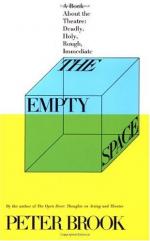
|
| Name: _________________________ | Period: ___________________ |
This quiz consists of 5 multiple choice and 5 short answer questions through The Immediate Theatre, part 1 (p 110 to 134).
Multiple Choice Questions
1. "A director dealing with elements that exist outside of himself can cheat himself into thinking his work more ______ than it is."
(a) Objective.
(b) Subjective.
(c) True.
(d) Honest.
2. What is the theatre district in London called?
(a) Broadway.
(b) SoHo.
(c) East End.
(d) West End.
3. Of whom does the author say, "His aim continually is holy, metaphysical, yet he never makes the mistake of staying too long on the highest plane"?
(a) Pinter.
(b) Shakespeare.
(c) Artaud.
(d) Beckett.
4. Whose recent production of Coriolanus underlines the whole question of where illusion begins and ends, according to the author (and the time the book was written)?
(a) The Royal Shakespeare Company.
(b) The Swan Theatre.
(c) The Berliner Ensemble's.
(d) Old Vic.
5. Whose "theatre is as close as anyone has got to Artaud's ideal"?
(a) Cunningham's.
(b) Beckett's.
(c) Brook's.
(d) Grotowski's.
Short Answer Questions
1. Who from the Martha Graham company has evolved a ballet company whose daily exercises are a continual preparation for the shock of freedom?
2. With whom did the author institute a group with the Royal Shakespeare Theatre called the Theatre of Cruelty?
3. Which playwright does the author hold in the greatest esteem as one who combines the Rough Theatre with the Holy Theatre?
4. What are audiences doing in "elevating something bad into a success"?
5. Who challenged Stanislavsky, proposing a different style of playing?
|
This section contains 240 words (approx. 1 page at 300 words per page) |

|




